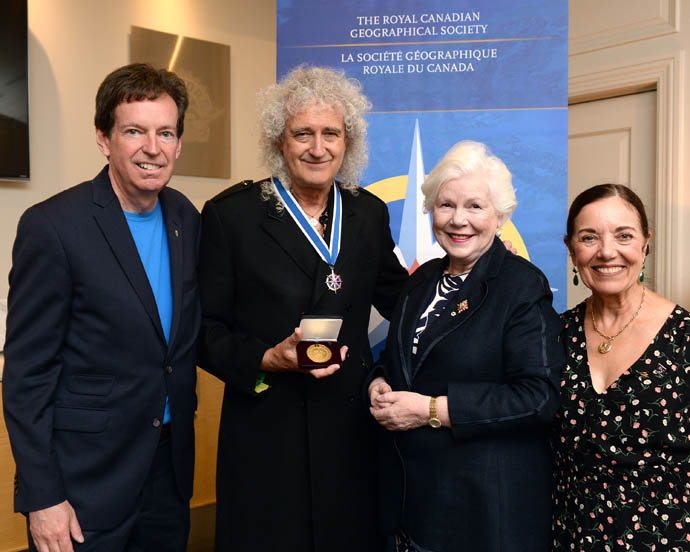
Brian May – receives RCGS medal
– https://youtu.be/Ixnzis7Bmco
Ottawa, July 29, 2019 — Brian May has received international acclaim as the lead guitarist and song writer for Queen, but he is increasingly for his work popularizing space science.
The rock legend, astrophysicist and author was presented with The Royal Canadian Geographical Society’s Lawrence J. Burpee Medal by Lieutenant Governor of Ontario Elizabeth Dowdeswell (an RCGS Fellow), RCGS CEO John Geiger, and RCGS Vice-president Wendy Cecil, in a ceremony prior to Queen’s July 28th, 2019 performance at Scotiabank Arena in Toronto. The Burpee Medal recognizes an individual’s contribution to the general advancement of geography. Past recipients include President Jimmy Carter, author Simon Winchester, and the Parks Canada dive team that led the discovery of HMS Erebus.
“We are honouring Dr. May for his work as an astrophysicist,” says Geiger, “and more particularly as someone who has used his enormous celebrity to promote greater public understanding of a field that can appear to many as dense as a black hole, but which represents so much of the hope for humanity, as well as the potential for discovery that lies ahead.”
May has co-authored several books on space including of Bang! – The Complete History of the Universe, The Cosmic Tourist and Mission Moon 3-D, has appeared on numerous television programs to explain cosmic subjects to the general public. In 2014, May co-founded the UN-sanctioned Asteroid Day on June 30th to promote a deeper understanding of the role of asteroids in the formation of our universe, the value of asteroid exploration and the need to protect Earth from asteroid collisions.
May was additionally recognized by the RCGS for his dedication to the revival of the 19th-century art of stereo photography, which produces images that, when viewed with a stereoscope, create a three-dimensional experience.
Dr. May has consulted with NASA’s New Horizons team on images sent by the spaceprobe to create the first 3D stereoanaglyph of “Ultima Thule” — officially (486958) 2014 MU69, the farthest object in the solar system ever visited by a spacecraft. Earlier this year, he released a new single “New Horizons” to mark the voyage of the space probe as it passed by Ultima Thule.